九年级英语学案Unit5 重点单词及情态动词用法
九年级unit5基础知识点
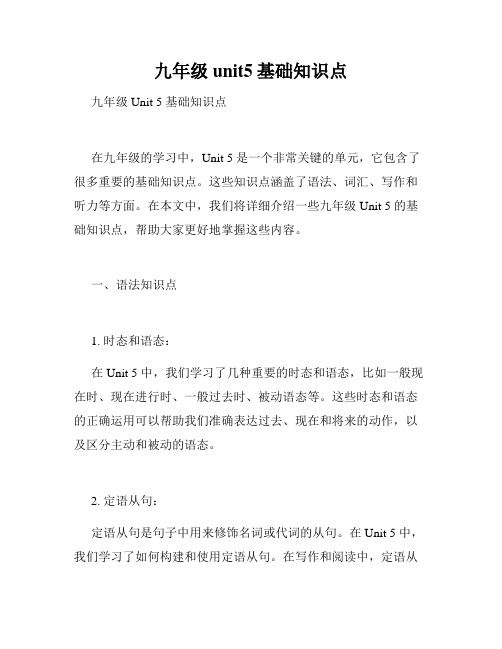
九年级unit5基础知识点九年级 Unit 5 基础知识点在九年级的学习中,Unit 5 是一个非常关键的单元,它包含了很多重要的基础知识点。
这些知识点涵盖了语法、词汇、写作和听力等方面。
在本文中,我们将详细介绍一些九年级 Unit 5 的基础知识点,帮助大家更好地掌握这些内容。
一、语法知识点1. 时态和语态:在 Unit 5 中,我们学习了几种重要的时态和语态,比如一般现在时、现在进行时、一般过去时、被动语态等。
这些时态和语态的正确运用可以帮助我们准确表达过去、现在和将来的动作,以及区分主动和被动的语态。
2. 定语从句:定语从句是句子中用来修饰名词或代词的从句。
在 Unit 5 中,我们学习了如何构建和使用定语从句。
在写作和阅读中,定语从句可以帮助我们更精确地描述事物,并且让句子更加丰富和有层次感。
3. 状语从句:状语从句是句子中用来表示时间、原因、条件、目的、结果等的从句。
在Unit 5 中,我们学习了如何使用不同类型的状语从句。
状语从句的运用可以帮助我们更准确地表达自己的意思,并且让语言更具连贯性和流畅性。
二、词汇知识点1. 单词拼写:在 Unit 5 中,我们学习了很多新的单词,并且需要掌握它们的正确拼写。
拼写正确的单词可以让我们的写作更加规范和地道,同时也提高了我们的阅读理解能力。
2. 同义词和反义词:在 Unit 5 中,我们也学习了一些同义词和反义词。
通过学习这些词语,我们可以扩展自己的词汇量,并且在写作和阅读中更加丰富我们的表达。
三、写作知识点1. 句型多样化:在写作中,我们需要尽量避免使用重复的句型,而是要多样化地表达自己的意思。
在 Unit 5 中,我们学习了一些新的句型和表达方式,可以帮助我们更好地组织和呈现自己的观点。
2. 写作连贯性:写作时,我们需要注意句子之间的连贯性。
通过使用适当的过渡词和连接词,我们可以使句子更流畅,段落更有逻辑性。
在Unit 5 中,我们学习了一些常用的连接词,比如however、therefore、in addition等。
Unit5重点短语人教版九年级英语全册
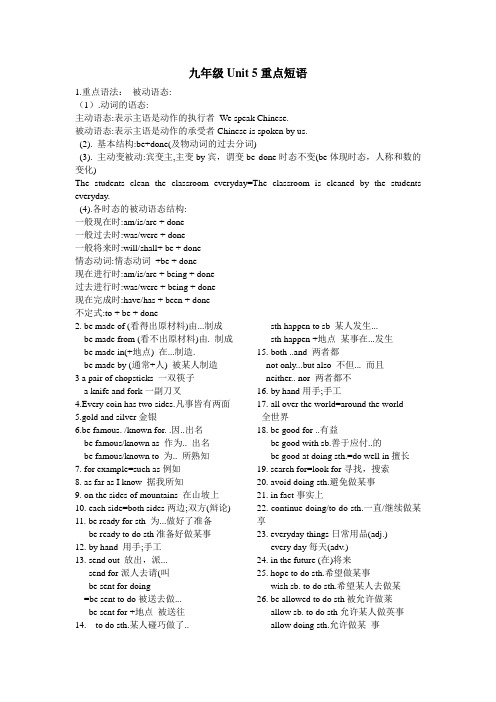
九年级Unit 5重点短语1.重点语法:被动语态:(1).动词的语态:主动语态:表示主语是动作的执行者We speak Chinese.被动语态:表示主语是动作的承受者Chinese is spoken by us.(2). 基本结构:be+done(及物动词的过去分词)(3). 主动变被动:宾变主,主变by宾,谓变be done时态不变(be体现时态,人称和数的变化)The students clean the classroom everyday=The classroom is cleaned by the students everyday.(4).各时态的被动语态结构:一般现在时:am/is/are + done一般过去时:was/were + done一般将来时:will/shall+ be + done情态动词:情态动词+be + done现在进行时:am/is/are + being + done过去进行时:was/were + being + done现在完成时:have/has + been + done不定式:to + be + done2. be made of (看得出原材料)由...制成be made from (看不出原材料)由. 制成be made in(+地点) 在...制造.be made by (通常+人) 被某人制造3 a pair of chopsticks 一双筷子a knife and fork一副刀叉4.Every coin has two sides.凡事皆有两面5.gold and silver金银6.be famous. /known for. .因..出名be famous/known as 作为.. 出名be famous/known to 为.. 所熟知7. for example=such as例如8. as far as I know 据我所知9. on the sides of mountains 在山坡上10. each side=both sides两边;双方(辩论)11. be ready for sth 为...做好了准备be ready to do sth准备好做某事12. by hand 用手;手工13. send out 放出,派...send for派人去请(叫be sent for doing=be sent to do被送去做...be sent for +地点被送往14. to do sth.某人碰巧做了..sth happen to sb 某人发生...sth happen +地点某事在...发生15. both ..and 两者都not only...but also 不但... 而且neither.. nor 两者都不16. by hand用手;手工17. all over the world=around the world全世界18. be good for ..有益be good with sb.善于应付..的be good at doing sth.=do well in擅长19. search for=look for寻找,搜索20. avoid doing sth.避免做某事21. in fact事实上22. continue doing/to do sth.一直/继续做某享23. everyday things日常用品(adj.)every day每天(adv.)24. in the future (在)将来25. hope to do sth.希望做某事wish sb. to do sth.希望某人去做某26. be allowed to do sth被允许做莱allow sb. to do sth允许某人做英事allow doing sth.允许做某事27. be covered by..被. ..覆盖be covered with..用..覆盖28 bring...to... 带来29. a pair of gloves 一双手套30.learn to do 学习做...learn about 了解learn from 向.. 学习learn.. by oneself = teach oneself 自学31. many different kinds of 不同种类的32.one's own+n.=...of one's own某人自己的...on one's own= by oneself= alone 独自the owner of .. 的主人33. turn into 变成34.according to 根据,按照36.rise into 升入37.be seen as 被视作38. paper cutting剪纸39.sky lanterns孔明灯40.at a very high heat在高温下41.be used for被用来... be used as被用作...be used by被...使用42.no matter what 无论什么43.change...into..把..变成...。
人教版 英语九年级 Unit5 知识点梳理

人教版英语九年级 Unit5 知识点梳理人教版英语九年级 Unit5 知识点梳理本文档旨在对人教版英语九年级 Unit5的知识点进行梳理和总结。
1.词汇本单元涉及的重要词汇有:science。
educate。
n。
museum。
physics。
post。
astronaut。
cell。
logy。
language。
chemistry。
___。
female。
male。
facility。
speech。
subject。
___等。
2.重点句型2.1 "What is your dream job?"(你的梦想职业是什么?)以及相关回答和提问方式,如"What do you want to be in the future?"(将来你想成为什么?)2.2 "Why do you want to be a…?"(你为什么想成为……?)以及相关回答,要求能够用连词because回答。
2.3 "What subject are you good at?"(你擅长什么学科?)以及相关回答,要求能够用形容词或名词回答。
2.4 "What are you going to be when you grow up?"(当你长大后你将成为什么?)以及相关回答,要求能够使用祈使句回答。
3.语法重点3.1 过去进行时(Past Continuous Tense)的基本用法和构成。
3.2 形容词的比较级和最高级的构成和用法。
3.3 特殊疑问句的构成和用法,如"What。
when。
where。
why。
who。
how等"。
3.4 倒装句的用法,如"Here comes the bus."(公交车来了。
)4.阅读理解4.1 阅读理解练,包括选择题和填空题,涉及职业、学科和个人兴趣等方面的内容。
4.2 阅读理解答题技巧,如通读全文、抓住关键词、回答问题时注意句意等。
人教九年级unit5知识点

人教九年级unit5知识点人教九年级Unit 5知识点Unit 5是人教九年级英语教材中的一个重要单元,主要涵盖了以下几个知识点:feelings and emotions(感觉和情绪)、verbs of perception(感知动词)、abstract nouns(抽象名词)、word formation(词汇形成)和情态动词must、have to和should等。
本文将逐一讨论这些知识点。
首先是feelings and emotions(感觉和情绪)。
在Unit 5中,我们学习了许多描述感觉和情绪的形容词,如happy(高兴的)、sad(悲伤的)、excited(兴奋的)、nervous(紧张的)等。
这些形容词可以帮助我们更准确地表达自己的感受和情绪,增强交流能力。
此外,我们还学习了一些与感觉和情绪有关的动词短语,如feel embarrassed(感到尴尬)、be afraid of(害怕)等,这些动词短语可以帮助我们描述自己或他人的感受和情绪。
接下来是verbs of perception(感知动词)。
在Unit 5中,我们学习了一些常用的感知动词,如hear(听见)、see(看见)、smell(闻到)等。
这些动词可以帮助我们描述我们感知到的事物,从而更准确地表达自己的观点和感受。
例如,当我们看到一只漂亮的花时,我们可以使用句子"I see a beautiful flower"来表达自己的感受。
另一个重要的知识点是abstract nouns(抽象名词)。
在Unit 5中,我们学习了一些包含抽象概念的名词,如happiness(幸福)、sadness(悲伤)、excitement(兴奋)等。
这些抽象名词可以帮助我们更具体地描述我们的感受和情绪,使我们的语言更加生动丰富。
例如,当我们想表达自己的幸福时,我们可以使用句子"I am filled with happiness"来表达。
九年级英语unit5重点知识点

九年级英语unit5重点知识点Introduction英语是一门国际语言,掌握好英语对我们的学习和未来的发展都非常重要。
而九年级英语Unit5是我们学习英语的关键阶段,掌握好这些重点知识点将对我们的学习产生积极的影响。
本文将详细介绍九年级英语Unit5重点知识点,帮助我们更好地理解和掌握这些知识。
1. 词汇学习1.1 动词短语英语中常用的动词短语对我们的语言表达非常重要。
在Unit5中,我们学习了一些常见的动词短语,例如:“look forward to”(期待),“give up”(放弃),“take care of”(照顾)等等。
通过积累并灵活运用这些动词短语,我们可以提高我们的写作和口语表达能力。
1.2 词义辨析英语中常常有一些词义相近的单词,但它们的细微差别对于我们正确使用非常重要。
在Unit5中,我们学习了一些词义相近但用法有所区别的词汇,例如:“travel”(旅行)和“trip”(旅程),“break”(打破)和“damage”(损坏)等等。
掌握这些词汇的细微差别,有助于我们更加准确地表达自己的意思。
2. 语法学习2.1 过去进行时过去进行时是我们在描述过去某个特定时间正在进行的动作时经常使用的时态。
在Unit5中,我们学习了过去进行时的构成和用法。
例如:“I was studying when she called”(她打电话时,我正在学习)。
理解和正确运用过去进行时可以使我们的叙述更加生动有趣。
2.2 条件句条件句是我们在表达假设、可能性或者特定条件下会发生的事情时常常使用的句型。
在Unit5中,我们学习了三种类型的条件句:零条件句,一般条件句和虚拟条件句。
例如:“If it rains, we will stay at home”(如果下雨,我们会呆在家里)。
学习并熟练运用这些条件句结构,有助于我们更好地表达自己的意思和理解他人的观点。
3. 阅读理解3.1 阅读技巧阅读理解是英语学习中非常重要的一项能力。
九年级unit5笔记

九年级unit5笔记一、单词与短语enthusiastic:热情的,热心的devote:投入,奉献ambassador:大使doubt:怀疑custom:习惯,风俗awkward:尴尬的awkwardly:尴尬地occasion:场合tie:领带embarrassed:尴尬的二、句子结构与表达一般过去时态的用法:用于描述过去发生的事情。
例如:“Last week, we visited the Great Wall.”情态动词的用法:如“could”, “should”和“would”。
例如:“He said he could finish the task by tomorrow.”被动语态的用法:例如:“The book was written by him.”虚拟语气的用法:用于表示假设或与现实相反的情况。
例如:“If I were you, I would take the job.”定语从句的用法:例如:“The man who spoke at the meeting is my boss.”三、语法重点现在完成时的用法:表示过去发生的动作对现在有影响。
结构为“have/has + 过去分词”。
例如:“I have already finished my homework.”形容词的用法:描述名词的性质或状态。
例如:“She is beautiful.”副词的用法:描述动词、形容词或其他副词的性质或状态。
例如:“He runs quickly.”介词的用法:表示事物之间的关系。
例如:“I am interested in this project.”连词的用法:连接词与词、短语与短语、句子与句子。
例如:“Although he is young, he knows a lot.”四、作文练习写一篇关于一次难忘的经历的短文,描述事件发生的过程和你的感受。
使用现在完成时和一般过去时态描述。
英语人教版九年级全册Unit 5 Grammar (情态动词)

Unit5 It must belong to Carla.(Grammar)一、教材分析:本单元主要围绕情态动词“must, might, could, can`t ”等表推测的用法展开,通过灵活运用这些情态动词,让学生学习推理,培养学生的逻辑判断能力。
二、学习目标1. 了解近五年中考情态动词考情。
2. 学会灵活运用情态动词的重要用法。
3.情感目标培养学生的逻辑思维和推断能力三、教学重点难点情态动词的重要用法。
四、教具使用黑板,多媒体课件五、教学方法探究式教学,任务型教学六教学步骤:教学过程教学设计与分析Step1 GreetingSay hello to the students ,then introduce myself to thestudents .(设计意图:用问候消除师生间的陌生感,做好课堂师生的配合铺垫)Step2 Show the learning aims:出示学习目标,让学生掌握本节课的学习任务。
Step3 Analyze the exam exercises通过展示近五年河北中考情态动词的考题,让学生掌握情态动词的考法和用法。
(设计意图:学生观察表格,明白中考考情态动词侧重点。
)Step4 Show the key points播放幻灯片,让学生了解情态动词的重要用法,并能用思维导图把它们的用法总结出来。
(设计意图:通过学生自主学习,掌握情态动词的基本用法和表推测的用法。
)Step4 practice播放历年各省市的中考题,让学生掌握做题的技巧和方法。
(设计意图:问答形式再次操练情态动词的用法,加深学生对它们的理解)Step5 Summary让学生自己总结本节课的知识点和易错点。
(设计意图:通过填空的形式,让学生再次巩固易错点。
)Step6 practice学生运用知识点去做巩固练习,做完后,小组内先交流。
(设计意图:独立完成巩固练习,并核对答案通过课堂练习,检测学生对本课知识的掌握情况)。
九年级英语第五单元知识点总结

九年级英语第五单元知识点总结一、重点单词1. belong- 用法:belong to sb. / sth.,表示“属于某人/某物”,无被动语态,也不用于进行时态。
例如:This book belongs to me.(这本书属于我。
)2. picnic- 相关短语:go for a picnic(去野餐);have a picnic(进行野餐)。
例如:We are going for a picnic this weekend.(我们这个周末打算去野餐。
)3. author4. hair band- 词义:发带。
例如:I found a hair band on the playground.(我在操场上发现了一个发带。
)5. possibly- 词性:副词,词义:可能地;也许。
例如:It may possibly rain tomorrow.(明天也许会下雨。
)6. drop- 用法:- 作动词,有“落下;掉下;使落下”等意思。
例如:He dropped his pen on the floor.(他把笔掉在地上了。
)- 还可表示“放弃(想法、计划等)”,例如:He dropped the idea of going abroad.(他放弃了出国的想法。
)- 相关短语:drop by(顺便访问);drop in on sb.(顺便拜访某人);drop off(减少;让……下车)。
7. symphony- 词义:交响乐;交响曲。
例如:Beethoven wrote many famous symphonies.(贝多芬写了许多著名的交响曲。
)8. optometrist- 词义:验光师;配镜师。
例如:You should go to an optometrist to check your eyesight.(你应该去验光师那里检查视力。
)9. appointment- 用法:make an appointment(预约);have an appointment(有约会)。
九年级英语第五单元知识点

九年级英语第五单元知识点第一部分:动词时态动词时态是英语语法中重要的一部分。
在第五单元中,我们学习了以下几种时态:1. 一般现在时(Simple Present Tense):用来表示客观事实、经常性的动作或习惯等。
例如:I eat breakfast every morning.(每天早晨我都吃早餐。
)2. 一般过去时(Simple Past Tense):用来表示过去发生的动作或状态。
例如:She finished her homework last night.(她昨晚完成了她的作业。
)3. 现在进行时(Present Continuous Tense):用来表示现阶段正在进行的动作。
例如:They are playing basketball in the park.(他们正在公园里打篮球。
)4. 过去进行时(Past Continuous Tense):用来表示过去某一时刻正在进行的动作。
例如:He was watching TV when I called him.(当我给他打电话时,他正在看电视。
)5. 将来时(Future Tense):用来表示将来发生的动作或状态。
例如:We will visit our grandparents next weekend.(我们下个周末会去看望我们的祖父母。
)第二部分:被动语态被动语态是英语中一种常用的语法结构。
在第五单元中,我们学习了如何构成被动语态。
被动语态的构成方式是:be动词(am/is/are/was/were)+过去分词。
1. 一般现在时的被动语态:am/is/are + 过去分词。
例如:The book is written by Mark Twain.(这本书是马克·吐温写的。
)2. 一般过去时的被动语态:was/were + 过去分词。
例如:The film was directed by Steven Spielberg.(这部电影是由史蒂文·斯皮尔伯格导演的。
人教版九年级全一册英语Unit5重点语法知识点总结
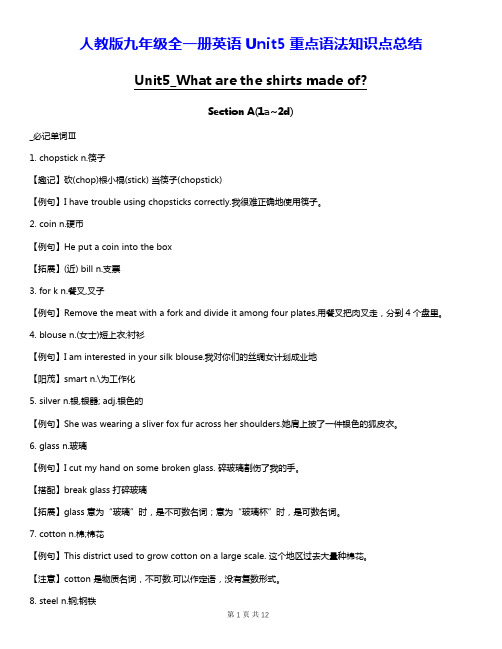
人教版九年级全一册英语Unit5重点语法知识点总结Unit5_What are the shirts made of?Section A(1a~2d)_必记单词Ⅲ1. chopstick n.筷子【趣记】砍(chop)根小棍(stick) 当筷子(chopstick)【例句】I have trouble using chopsticks correctly.我很难正确地使用筷子。
2. coin n.硬币【例句】He put a coin into the box【拓展】(近) bill n.支票3. for k n.餐叉,叉子【例句】Remove the meat with a fork and divide it among four plates.用餐叉把肉叉走,分到4个盘里。
4. blouse n.(女士)短上衣;衬衫【例句】I am interested in your silk blouse.我对你们的丝绸女计划成业地【阳茂】smart n.\为工作化5. silver n.银,银器; adj.银色的【例句】She was wearing a sliver fox fur across her shoulders.她肩上披了一件银色的狐皮衣。
6. glass n.玻璃【例句】I cut my hand on some broken glass. 碎玻璃割伤了我的手。
【搭配】break glass 打碎玻璃【拓展】glass 意为“玻璃”时,是不可数名词;意为“玻璃杯”时,是可数名词。
7. cotton n.棉;棉花【例句】This district used to grow cotton on a large scale. 这个地区过去大量种棉花。
【注意】cotton 是物质名词,不可数.可以作定语,没有复数形式。
8. steel n.钢;钢铁【例句】Hot steel is quenched to harden it.烧热的钢放入水中骤冷使之坚硬。
九年级Unit5知识点

九年级Unit5知识点一、Words1、possible (adj.)--- possibly (adv.)2、wind (n.) + y = windy (adj.)possible------ impossible 3、direct (v.)指挥,指导+ or =director (n.)主管4、drop--- dropped--- dropping5、final (adj.)+ ly= finally (adv.) 最后地drop by 拜访the final exam 期末考试a drop of (water) 一滴(水)finally= at last= in the end6、catch--- caught--- caught7、honest (adj.)诚实的--- dishonest (adj.)不诚实的catch the bus 搭公车= take the bus/ by bus an honest girl 一个诚实的女孩catch up with 赶上an hour 一个小时8、noise (n.) + y= noisy (adj.) 喧闹的9、mystery (n.)--- mysterious (adj.) 神秘的noisily (adv.) 10、happy (adj.) ----happily (adv.)make a noise 制造噪音unhappy (adj.)--- unhappily (adv.)11、smell (v.) 闻起来+ adj. (adj. 做表语,smell 做连系v.)a smell (n.) of 一股…气味a taste (n.) of 一股…味道a feel (n.) of 一丝…感觉12、neighbor (n.) 邻居13、careful (仔细)--- careless (粗心)neighborhood (n.) 社区carefully (adv.) --- carelessly (adv.)二、Phrases1、belong to 属于(没有被动语态,to后跟名词或代词做宾语)2、because + 从句He didn’t come because it rained.because of +n. (pron.) 动名词He didn’t come because of the rain.3、use up 用光= run out of4、next door 隔壁use + 代词+up next door neighbor 隔壁邻居5、escape from 从…逃走7、pretend to do sth. 假装做…6、be anxious to do sth. 渴望做…pretend not to do sth. 假装不干…be anxious about 为…感到焦虑/担心8、be careful of + n. 小心…be worried about 为…感到焦虑/担心be careful (not ) to do sth.小心(不)干…9、a woman with a camera 一个带着相机的女的(with 带着)see with eyes 用眼睛看(with+东西,用…)with his help 在他的帮助下I go to school with her 我和她一起上学(with 表伴随)10、get on 上车get back 取回get out of 从…出去get off 下车get to 到达=reachget up 起床get home 到家get away 逃跑离开get ready for 为…作准备11、may + V原(情态动词) 也许,肯能12、in the sky 在天空中maybe 副词,也许,可能,做状语13、make up 组成,形成may be + n./ adj./ 介词短语可能是be made up of 由…组成14、go for a picnic= have a picnic 野餐15、let sb. do sth. 让…干…at the picnic 在野餐let sb. not do sth. 让…不干…16、call the police 报警17、be interviewed by 被…采访三、Sentences.1、It must be Ning’s. It has her name on it. 肯定是宁的。
九年级英语第五单元重要知识点

九年级英语Unit51.情态动词must, may , might, could, may , can ’t 表示推测含义与用法后面都接动词原形,都可以表示对现在情况的揣测和推断但他们 含义有所不同)(20%-80%的可能性) ) The dictionary must be mine. It has my name on it. The CD might/could/may belong to Tony becausehe likes listening to pop music.The hair band can ’t be Bob ’s. After all, he is boy! 2. whose 谁的 疑问词 作定语 后面接名词 如:Whose book is this? This is Lily ’s. 3. belong to 属于 如:That English book belongs to me. 8. try to do sth. 尝试做某事 如: I try to climb the tree. 我尝试爬树。
10. own v.-owner n. listen v.-listener n. learn v.-learner n. 11. catch a bus 赶公车 12. neighbor 邻居 指人neighborhood 邻居 指地区也可指附近地区的人 13. local 当地的 如:local teacher 当地的教师 14. noise n. 噪音 是个可数名词 noises15. call the police 报警 如:Quick! Call the police! 快!叫警察! 16. anything strange 一些奇怪的东西当形容词修饰something, anything, nothing, everything 等不定代词时,放在这些词的后面 17. there be sb./ sth. doing 如: There is a cat eating fish.There must be something visiting our home. 18. escape from …从哪里逃跑出来 如:He escaped from the burning building. 他从燃烧的大概中逃出来。
九年级Unit5知识点

Unit5 单元重点归纳一、重点短语be made of 由……制成的(表示制成成品后,仍可看出原材料是什么)be made from 由……制成的(在成品中已无法辨认原材料)be known for 以……闻名be used for 被用于……no matter 不论;无论be covered with 用……覆盖as far as I know 据我所知by hand 用手be good for 对……有益on the last Friday of each month 在每个月的最后一个星期五be good at 擅长make high-technology products 制造高科技产品the earth’s surface 地球表面different kinds of 不同种类的fly a kite 放风筝such as 例如according to 根据按照ask for help 请求帮助 a symbol of ……的象征put…on… 把……放在……上good luck 好运at a very high heat 在高温下be made in 在……制造的be famous for 以……著名on the sides of mountains 在山腰上all over the world=around the world 全世界traffic accident 交通事故a kite festival 风筝节be from 来自turn…into…把……变成……send out 放出in trouble 处于困境中rise into 上升上涨paper cutting 剪纸be used by 被……使用during the Spring Festival 在春节期间sky lanterns 孔明灯二、重点结构1. 被动语态:Be+及物动词的过去分词2. No matter +从句“无论”3. find it +形容词+that 从句“发现……是怎样的”4. it seems that +从句“好像”5. buy sb. sth. =buy sth for sb 给某人买某物6. avoid doing sth 避免做某事7. allow sb to do sth 允许某人做某事三、辨析1. be made of, be made from与be made inbe made of 意为“是……(原材料)制成的”。
人教版九年级英语unit5知识点

人教版九年级英语unit5知识点人教版九年级英语Unit 5知识点总结在九年级英语教材中,Unit 5是一个重要的单元,涵盖了多个知识点。
本文将对这些知识点进行总结和归纳。
词汇在Unit 5中,我们学习了许多新的词汇。
其中包括动物的名称,如elephant、tiger和panda;各种食物的名称,如hamburger、chicken和pizza;以及各种交通工具的名称,如bicycle、bus和train。
通过学习这些词汇,我们能够更好地描述我们周围的事物,提高我们的词汇水平。
语法在本单元中,我们学习了一些重要的语法知识。
其中之一是there be句型。
这个句型用于描述某个地方存在或发生的事物。
例如,There is a book on the desk.和There are many students in theclassroom.通过掌握there be句型,我们能够更准确地表达我们所见所闻。
另一个重要的语法知识点是情态动词can和may。
can用于表达能力,may用于表示许可。
例如,I can play the piano.和May I go to the bathroom?掌握这些情态动词,可以帮助我们更好地与他人交流。
阅读理解在Unit 5中,我们进行了一些阅读理解的训练。
通过阅读不同主题的文章,我们能够提高我们的阅读理解能力,并学到更多的知识。
例如,我们读了一篇关于动物保护的文章,了解到全球范围内的一些保护动物的组织和活动。
这样的阅读理解训练有助于我们开阔视野,增长知识。
口语表达在Unit 5中,我们也进行了一些口语表达的练习。
通过与同学们合作进行对话,我们学会了如何礼貌地询问和回答问题,如How can I get to the park?和You can take the bus.这些练习提高了我们的口语表达能力,使我们能够更流利地与他人交流。
写作能力在Unit 5中,我们练习了一些英语写作。
九年级英语unit5知识点讲解
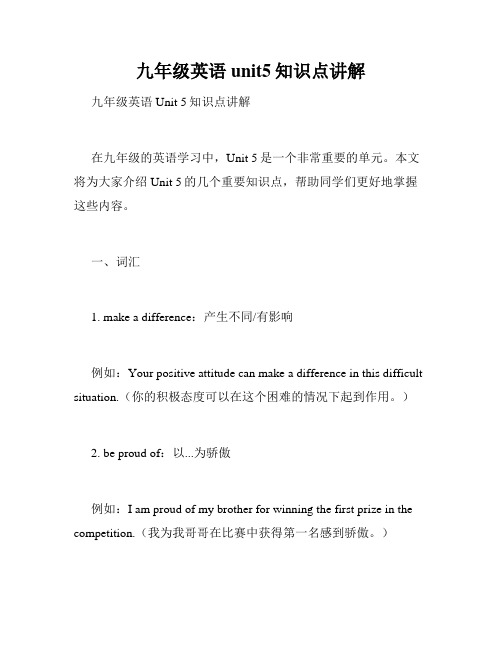
九年级英语unit5知识点讲解九年级英语Unit 5知识点讲解在九年级的英语学习中,Unit 5是一个非常重要的单元。
本文将为大家介绍Unit 5的几个重要知识点,帮助同学们更好地掌握这些内容。
一、词汇1. make a difference:产生不同/有影响例如:Your positive attitude can make a difference in this difficult situation.(你的积极态度可以在这个困难的情况下起到作用。
)2. be proud of:以...为骄傲例如:I am proud of my brother for winning the first prize in the competition.(我为我哥哥在比赛中获得第一名感到骄傲。
)3. take part in:参加例如:I want to take part in the school talent show.(我想参加学校的才艺表演。
)4. set goals:设定目标例如:In order to achieve success, it's important to set goals for yourself.(为了取得成功,设定目标对你很重要。
)5. achieve success:取得成功例如:With hard work and determination, I believe you can achieve success in whatever you do.(凭借努力和决心,我相信你无论做什么都能够取得成功。
)二、语法1. It is/was + 形容词 + to do sth.: 做某事是/感到某种感觉例如:It is interesting to learn a new language.(学习一门新语言很有趣。
)2. Would like to + 动词原形:想要做某事例如:I would like to travel around the world one day.(有一天我想环游世界。
【推荐下载】九级新目标英语知识点详解:Unit Five(1)
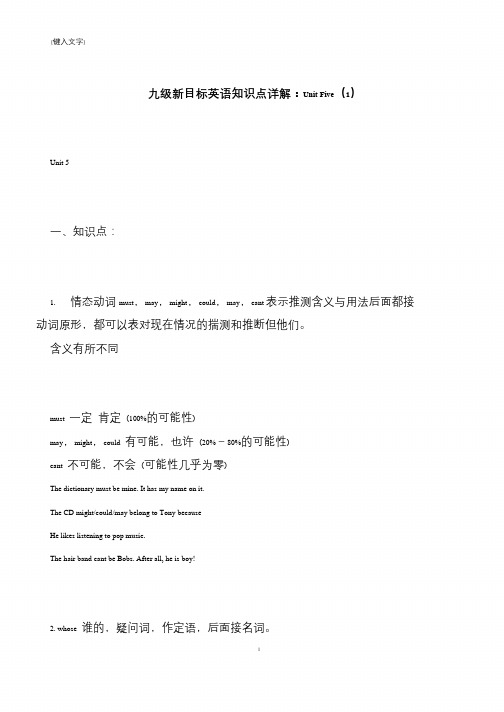
19.anoceanof+名词,极多的,用不尽的
如:anoceanofenergy
20.unhappy不高兴的
5
[键入文字]
25emptedtoleaveforBeijing.男孩子们试图想去北京。
cant不可能,不会(可能性几乎为零)
Thedictionarymustbemine.Ithasmynameonit.
TheCDmight/could/maybelongtoTonybecause
Helikeslisteningtopopmusic.
ThehairbandcantbeBobs.Afterall,heisboy!
[键入文字]
九级新目标英语知识点详解:UnitFive(1)
Unit5
一、知识点:
1.情态动词must,may,might,could,may,cant表示推测含义与用法后面都接
动词原形,都可以表对现在情况的揣测和推断但他们。
含义有所不同
must一定肯定(100%的可能性)
may,might,could有可能,也许(20%-80%的可能性)
2.whose谁的,疑问词,作定语,后面接名词。
1
[键入文字]
6.ifyouhaveanyidea=ifyouknow如果你知道
7.on关于(学术,科目)
8.trytodosth.尝试做某事
如:Itrytoclimbthetree.我尝试爬树。
9.becauseof,because
becauseof+名词/代词/名词性短语
九年级新目标英语知识点详解专题,阅读更多相关文章!
人教版 初中英语九年级教案 之 Unit 5 + 情态动词表推测

Unit 5 It must belong to Carla.本单元要完成以下学习任务:1.学习用情态动词表示推测。
2.学习根据相关的信息进行合理的推断。
3.学习must, might, could和can’t的用法及区别。
4.学习一些重要的单词、短语和句型。
一、重难点提示1.It must belong to Carla. 那肯定是Carla的。
(1)must表示肯定的猜测,意为“一定是……,必然……”,后面接动词原形。
e.g. It’s too late. He must be aw ay.太晚了,他肯定走了。
She must dislike such a joke.她肯定不喜欢那种玩笑。
(2)belong to意为“属于……所有;属于……之一员”。
(不用于进行时)e.g. This is not my car. It belongs to my uncle.这不是我的车,是我叔叔的。
Who does this backpack belong to?这个书包是谁的?I belong to our school soccer club.我是校足球俱乐部的。
※ This book belongs to me. =This book is mine. = This is my book.2.Whose volleyball is this? 这是谁的排球?=Whose is this volleyball?=Who does this volleyball belong to?3.There is a hair band, so the person can not be a boy.这里有一个发带,那么这个人肯定不是个男孩。
can’t be意为“肯定不是”,是一种语气很肯定的否定,是“must be”的反义词。
e.g. —Who is that man?—It may be Mr. Zhang?—No, it can’t be Mr. Zhang. He has gone to Beijing.—那个人是谁?—可能是张先生吧。
九年级上册英语u5知识点

九年级上册英语u5知识点英语作为一门重要的外语,我们在学习过程中需要牢记各个知识点。
本文将介绍九年级上册英语Unit 5的一些重要知识点,以帮助同学们更好地掌握这些内容。
1. 单词记忆在Unit 5中有一些常见的单词需要掌握。
比如:matter(事情,物质),allow(允许),prevent(阻止),damage(破坏),destroy(摧毁)等等。
建议通过写单词卡片、多次背诵等方法进行记忆,以加深对这些单词的印象。
2. 句型翻译在对话和阅读材料中,我们可以学到一些常见的句型。
例如:a. "What's the matter with you?" 在这个句型中,我们可以通过询问某人“出了什么问题?”来了解对方的情况。
b. "What would you do if...?" 这是一个虚拟条件句,它可以用来向对方提出假设性的问题,并询问对方对于某种情况将会采取什么行动。
c. "If I were you, I would..." 这是一个虚拟条件句的另一种形式,用来向对方提供建议或者表达自己的意见。
3. 阅读理解技巧Unit 5中有一篇关于环境保护的阅读材料,我们应该掌握一些阅读理解的技巧,以提高我们的阅读能力。
以下是几点建议:a. 首先,快速浏览全文,了解文章的大意和结构,这有助于提前预知作者的观点和主题。
b. 其次,注意文章中的关键词,比如人名、地名、事件等,这些词汇对于理解全文很重要。
c. 第三,注意文章中的词汇和句子结构,如果遇到不认识的单词,可以通过上下文猜测词义。
d. 最后,阅读完全文后,要仔细思考问题并回答,确保理解了文章的内容。
4. 语法重点在Unit 5中,我们学习了情态动词和虚拟语气的使用。
这两个语法点在英语中应用广泛,需要我们好好掌握。
a. 情态动词:情态动词用来表示想法、能力、允许、义务等,常见的情态动词有 can, could, may, might, must, shall, should, will, would, ought to等。
九年级英语Unit 5重点

九年级英语Unit 5重点一现在完成时态⑴由have/ has +过去分词⑵表示过去发生或已经完成的某一动作对现在造成的影响或结果常与already, just , yet , ever, never 连用Have you finished your work yet?你完成了你的工作了吗?Yes, I have. I have just finished it.是的。
我刚刚完成了。
I have already finished it .我已经完成了。
Have you ever been to China?你曾经去过中国吗?No, I have never been there.没有,我从来也没有去过。
⑶①表示过去已经开始,持续到现在的动作或状态和表示过去某一时刻延续到现在(包括现在在内)的一段时间的状态连用如:(for + 时间段,since + 时间点,或过去某一动作,以及how long )②注:非延续性动词在现在完成时态中不能和for, since 引导的表示一段时间的状语的肯定句连用。
应转为相应的延续性动词如:buy---- have die---- be dead join ---- be inborrow----- keep leave---- be awayI have bought a pen.------ I have had a pen for 2 weeks.The dog has died.------- The dog has been dead since last week.⑷①have (has) been to + 地点去过某地已经回来②have (has) gone to + 地点去了某地没有回来③have been in + 地点一直呆在某地没有离开过如:She has been to Shanghai. 她去过上海。
(已经回来)She has gone to Shanghai. 她去了上海。
- 1、下载文档前请自行甄别文档内容的完整性,平台不提供额外的编辑、内容补充、找答案等附加服务。
- 2、"仅部分预览"的文档,不可在线预览部分如存在完整性等问题,可反馈申请退款(可完整预览的文档不适用该条件!)。
- 3、如文档侵犯您的权益,请联系客服反馈,我们会尽快为您处理(人工客服工作时间:9:00-18:30)。
Unit 5 It must belong to Carla.------------Words一、重点单词及用法集锦:1. belong to sb.(宾格:me/you/him/her/us/them) 属于某人This book is Tom’s.= This book belongs to Tom. 这本书是Tom的。
2.①possible ( adj.)可能的-----possibly (adv.)可能地②as …as possible 尽可能。
My mother looks after me as well as possible.You should come here as early as possible. 你应该早一点回来。
3. final (adj.) -----finally (adv.) = in the end = at last 最终the final test/result 期终测试/最后的结局4. ⑴own: ①(adj.) 自己的one’s own sth. 某人自己的东西②(v.) 拥有⑵owner (n.) 所有者,业主5.Smell: ①(n.) 气味②(vi.) 闻起来6.①noise 噪音(n.)②noisy (adj.)吵闹的③noisily (adv.)吵闹地7.①wind (n.)风—windy (adj.) 有风的②strong wind (adj. + n.)大风③The wind is blowing strongly. ( v. + adv.) 风正在猛烈得刮。
8. ①catch—caught—caught ②catch a bus赶公共汽车③catch a cold感冒,着凉⑷catch up with 赶上9. ①happy (adj.)高兴的----------happily (adv.)高兴地②unhappy (adj.)不高兴的----unhappily(adv.) 不高兴地③be/feel happy 觉得高兴⑷play happily 玩得高兴10. ①honest (诚实的)-----dishonest(不诚实的) ②an honest boy11. pretend to do sth 假装干…….12. use up 用光,耗尽(动副短语,代词放中间)二、重点词汇练习首字母填空1.This book b___________ to me. Look, my name is on the cover.2.He worked hard. F__________, he caught up with us.3.We must care for our o_________ eyes.4. Lu Xun is my favourite a__________.5. The boy ran to c_________ the bus.6.The heavy w_______ blew my hat off. It’s windy today.7.The boy is d__________. He often tells a lie.8.Everyone has two hands. It means everyone has ten f_______. 选择(把答案写在题号前)1.--Whose guitar is this?--It might __________ Alice. She plays the guitar.A. beB. belongC. belong toD. belongs2. ①Mother always look after their children_______.A. as well as possiblyB. as well as possibleC. as good as possiblyD. as good as possible②The famous author will_________ come to our school. So we’re happy.A. possibleB. impossibleC. possiblyD. impossibly③It’s _______ for us to lose the match. Because we are a strong team.A. possibleB. impossibleC. possiblyD. impossibly3. We found the lost child ________.A. in the end ofB. by the end ofC. in the endD. at the end of4. The _____ of the farm ______ thousands of cows.A. own, ownerB. owner, ownC. own, ownD. owner, owns5. The ______of the food _______ delicious.A. smell, tastesB. smells, smellsC. smell, is smellD. smell, smells6. ①My baby is sleeping now. Don’t make so much____.A. noiseB. noisesC. noisyD. noisily②I can’t work here , it’s far too _________.A. noiseB. noisesC. noisyD. noisily③Children are playing games _________. A. noise B. noises C. noisy D. noisily7. ①How ______ the wind is! A. big B. much C. heavy D. strong②How ______ the wind is blowing! A. strong B. strongly C. heavy D. heavily8. ①Put on your coat, or you’ll __________.A. catch a coldB. catch up withC. catch upD. catch hold of②Work hard! You’ll _________ others.A. catch up withB. get along withC. be angry withD. fall behind9.He was ______ because she failed in the exam.A. happyB. unhappyC. happilyD. unhappily10. He is _______honest boy. He never tells a lie. A. a B. an C. the D. \11. My daughter always pretends ____ when I get home after school.A. to asleepB. fall asleepC. to be asleep12.There’s no petrol(汽油)in my car. I have _____.A. use up itB. use it upC. used up it.D. used it up情态动词专练否定推测:can’t be肯定推测;must be(一定是)can be \ could be \ may be \ might be (可能是)表禁止;mustn’t一定有; There must beExercises:1. This book _____ Tom’s. Look! His name is on the book cover.A. mustn’t beB. may beC. can’t beD. must be2. Susan’s parents have bought a large house with a swimming pool. It ____ be very expensive.A. mustB. canC. willD. may2. Even the top students i n our class can’t work out this problem. So it ____ be very difficult.A. may notB. mustC. can’tD. need4. The light in Mr Brown’s bedroom is on. He ___ be at home now.A. canB. willC. mustD. could5. --Is Tom here yet? -- No yet, but he ______ be here soon. He usually is on time.A. wouldB. couldC. shouldD. must6. Susan _____ be here now because she has just gone to New York.A. mustn’tB. can’tC. needn’tD. may not7. –Who is the man over there? Is it Mr. Li? --No, it ____ be him. Mr. Li is much fatter.A. mustn’tB. may notC. can’tD. needn’t8. The young man ___ be Zhang Lei. He has gone to Beijing with his family.A. needn’tB. may notC. can’tD. mustn’t9. –Listen! Is that Kate playing the piano in the room? --No. It ____ be Kate. She has gone to London.A. may notB. needn’tC. mustn’tD. can’t10. --Look! Someone is dancing on the moon. --It _____ be true. Mum says there is no air there.A. can’tB. mustn’tC. mayD. shoul d11. – Where is Tom? --He hasn’t come to school today. I think he ___ be ill.A. has toB. shouldC. mayD. need12. –Excuse me. Where is the zoo? --Sorry, I don’t know. Ask that policeman. He ____ know.A. can’tB. mayC. needD. would13. –Where’s Lucy?--I’m not sure. She ___ in the school library.A. maybeB. must beC. may beD. will be14. This coat isn’t yours. Whose ____ it be? A. can B. need C. must D. will15. –Where is mom now? --I’m not sure. She _____ be in the kitchen.A. shallB. mayC. needD. must16. When a driver sees the sign STOP, he ____ stop. He ___ go on.A. must, mustn’tB. mustn’t, mustC. can, can’tD. can’t, can17. You ___ talk loud in the reading room.A. needn’tB. don’t have toC. mustn’tD. had better18. We ____ talk loudly when we see the sign on the right.A. mustB. mustn’tC. needD. needn’t19.--Must I go out for a walk now? -- No, you _______.A. mustn’tB. can’tC. needn’tD. may not20. --____ I finish the exercise before 12 o’clock?-- Yes, you _____.A. Must, needn’tB. Must, mustC. Can, needD. Could, may当堂检测:1.The backpack ____ be Jimmy’s . Look! His name is on it.A. canB. mayC. mustD. need2. The lady in the next room _____ be Miss Brown because she called me from New York just now.A. mustn’tB. may notC. can’tD. must3. –Where is Jack? --Sorry, I don’ t know. Go and ask his brother. He ___ know.A. canB. mayC. needD. will4. –Must we collect the waste paper and bottles now? --_____. You can do it after class.A. Yes, you mustB. No, you needn’tC. Yes, you mayD. No, you mustn’t5. It’s dangerous for children to play in the street. So they ______ play in the street.A. mustB. canC. mustn’tD. needn’tUnit 5 It must belong to Carla.Section A1. --Whose is this book? 这本书是谁的?--It’s Mary’s. 它是玛丽的。
